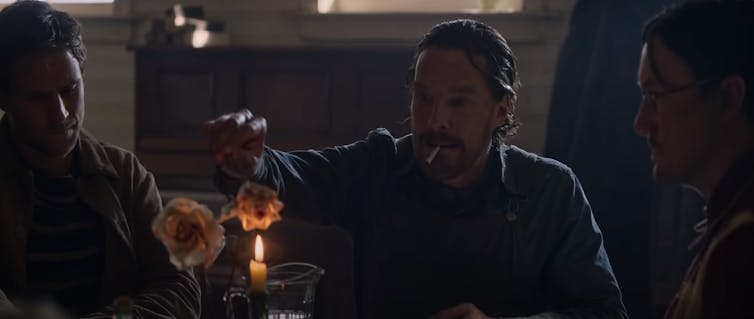
This story contains spoilers about “The Power of the Dog.”
The novel The Power of the Dog, written by American author Thomas Savage, garnered strong reviews when published in 1967 yet largely disappeared from public view in years following.
The humble literary history of this book — considered by some to be Savage’s best work and even a neglected masterpiece — may suggest the slow-burn approach of New Zealander director Jane Campion.
Campion’s film, based on Savage’s book, is up for 12 awards — including Best Director and Best Picture — at this year’s March 27 Academy Awards.
Campion’s first feature film in over a decade, The Power of the Dog has been widely viewed since its release on Netflix this past fall.
Powerfully understated
Campion’s Oscar-nominated screenplay stays close to the source of Savage’s original story, which is set on a Montana ranch in 1925, yet under her direction the film appears understated.
Viewers are left with, as critics have widely noted, details and connections implied rather than rendered explicit.
Dana Stevens and Jeffrey Bloomer, reviewing the film for Slate, discuss the annoyance of having to see a movie twice to understand the basic plot among other impressions of the “homoerotic thriller.”
Why has the film enthralled so many viewers and critics?
Never wears gloves
The story features two pairs of main characters: Peter (Kodi Smit-McPhee), the son of widowed Rose (Kirsten Dunst), and two middle-aged rancher brothers, the brooding and brilliant cowboy Phil (Benedict Cumberbatch), and the slower, softer George (Jesse Plemons).
Phil resents George’s sudden marriage to Rose. When she, and later Peter, arrive at the ranch, he does what he can to undermine and threaten Rose.
Many reviewers agree that Phil is a figure of “toxic masculinity.” He rides and swaggers hard, never wears gloves and avoids baths and haircuts. He can be a menacing bully who hates sentimentality and softness. He mocks Peter’s feminine interests.
Yet he’s not all bad: he charms his ranch hands and has a soft spot for the dead cowboy, Bronco Henry. He holds Bronco Henry up to George as their mutual mentor, but the film progressively reveals his hidden homoerotic memories and feelings — feelings he eventually transfers to Peter.
Coaxing audience involvement
In our gender and sexuality savvy times, many films have examined homoerotic repression, so Campion is not particularly innovative here. Where the film innovates is in establishing gaps to stimulate imaginative participation.
In cultural theorist and communication scholar Marshall McLuhan’s terms, film is typically a “hot medium” that provides a coherent narrative and visual details to deliver pre-packaged meaning. This film deliberately abandons that approach.
Instead, it comes closer to what he called a “cool medium,” leaving spaces that coax audience involvement.

Securing his mother’s happiness
Reviews raise questions about plot and characters, some going so far as to call the film a “whodunnit.”
A central mystery of the film revolves around Peter and his role in the film’s denouement. Viewers first gain tentative glimpses of Peter performing acts of violence: killing rabbits, but as a dedicated student learning anatomy for an exam. Later, he’s seen scaling a hide from a decaying cow carcass.
Only in subtle clues might viewers catch that it’s anthrax-ridden. Peter uses gloved hands to poison a gift intended for him: a rope Phil is braiding.
When viewers see Phil stagger off in a death stupor, he’s holding the rope and calling for Peter, suggesting he knows he’s been bested by the boy.
In an anti-Hamlet turn, Peter has committed murder most foul to secure his mother’s happiness. He avenges his father by coldly taking steps to protect her new relationship.
Brandon Taylor, writing for The New Yorker asks why Phil doesn’t kill Peter after discovering the boy found his cache of homoerotic magazines, since in Phil’s world, this discovery could be lethal. Viewers may be left to wonder: Is Phil truly interested in Peter, or will he use Peter as ammunition to hurt Rose?
Reassembling the old West
Perhaps to signal to viewers she is presenting a place not resembling the old West so much as reassembling it, Campion used her native New Zealand to stand in for rural Montana.
This West is mysterious enough to provoke sometime-cowboy actor Sam Elliott to demand, “Where’s the Western in this Western?” and far blunter criticism.
Murder mystery aside, many of the film’s narrative gaps have left viewers astounded trying to describe the plot, as if trading in facts. Some, for instance, maintain it’s clear that Rose spirals into alcoholism upon seeing Peter and Phil grow closer.
Yet while their bonding contributes to her anxiety, she began drinking before that friendship started. An unanswered question here is how long before, and perhaps even whether she’ll stop drinking after Phil’s gone.
And why exactly has the magnetic Phil gotten so deeply under her skin?
Troubled moral code

Campion leaves clues throughout that Peter is the one to watch beginning with his opening voiceover: “When my father died, all I ever wanted to do was protect my mother. And what kind of man would I be if I didn’t protect my mother?”
Phil seems to want a world of men without women. Yet this is not Hemingway’s world where heroes succeed by exercising rigid self control as moral code. Instead, the Psalmic incantation (from the Biblical Book of Psalms, Psalm 22:20) that shows up at the end alludes to taking care in the face of temptation, violence, animal instinct or evil: “Deliver my soul from the sword/ My darling from the power of the dog.”
“Taking care” and protecting others in this film, something feminists have explored as an “ethics of care,” is fraught in this film rather than simple.
Typed as toxic, and an outsider to heteronormative marital stability, Phil is also vulnerable and lonely with his secret. Peter, meanwhile, shows himself capable of literally doling out toxicity to remove harms.
When Rose and George embrace in the moonlight, it’s also unclear to what extent domestic heterosexual bliss has been secured.
Moral action against a big sky
By presenting moral action as situational and hard to determine, the movie forces viewers to imagine possible explanations. It also overflows with atmospheric touches to move viewers’ senses and make us feel. The score, by Radiohead’s Johnny Greenwood, gives us western twang with eerie edge.
Visually, there are many shots of skies and hills. Campion delivers a gothic neo-western, a surrealistic treatment.
Another McLuhanism comes to mind: “the medium is the message.” The film is a textbook example of McLuhan’s gnomic pronouncement.
Crafted to make demands on viewers, this film requires re-screening rather than mindless fast consumption. At a moment when more than ever we need to be able to think for ourselves, the film and Campion deserve credit for taking us to school.
Jaqueline McLeod Rogers does not work for, consult, own shares in or receive funding from any company or organisation that would benefit from this article, and has disclosed no relevant affiliations beyond their academic appointment.
This article was originally published on The Conversation. Read the original article.







